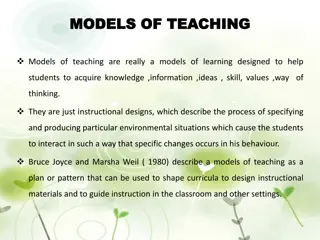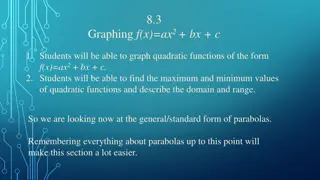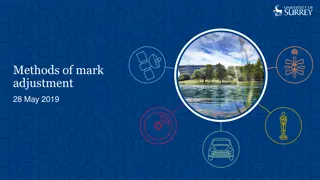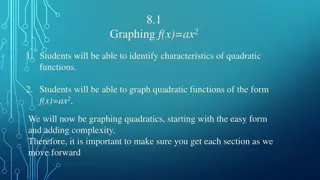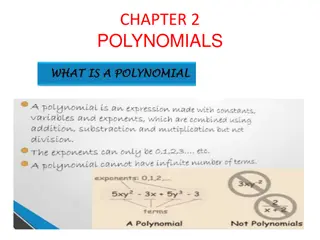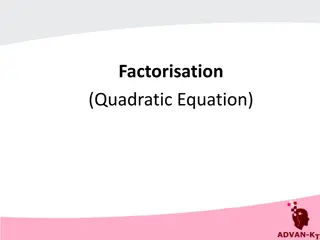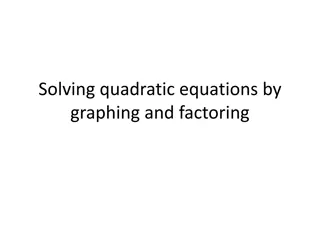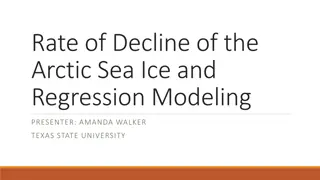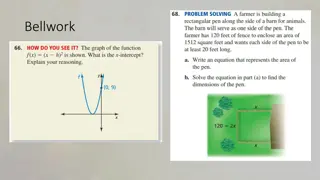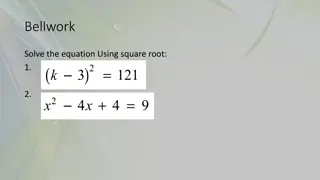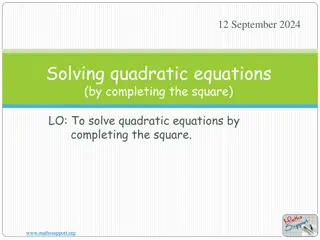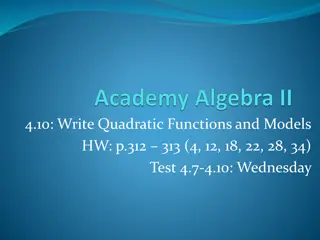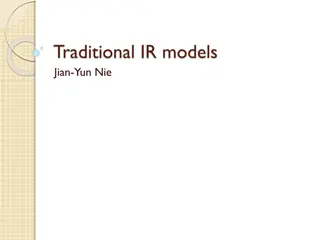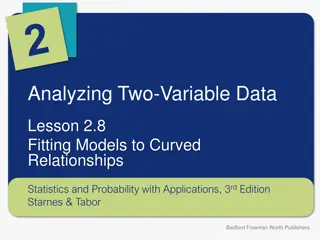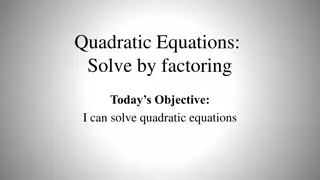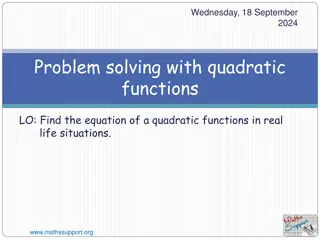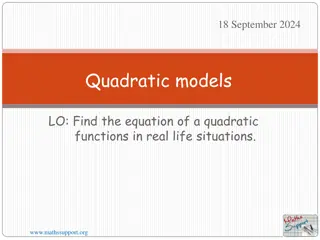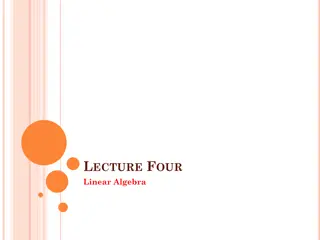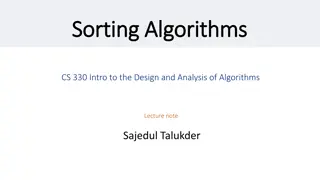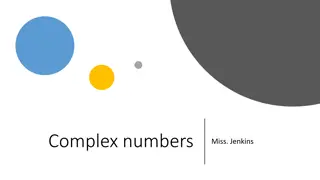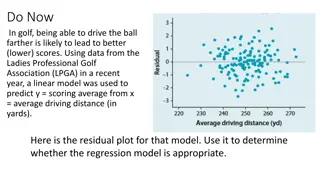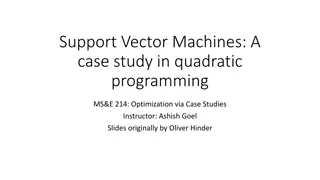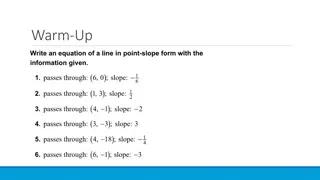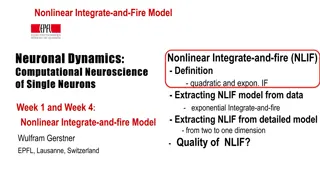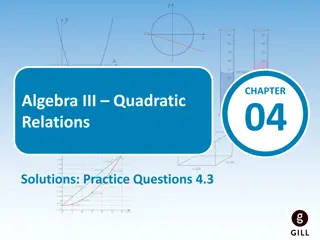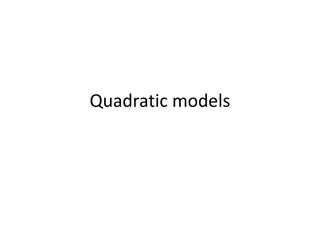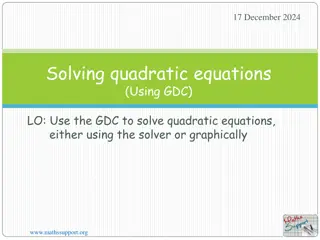System Models in Software Engineering: A Comprehensive Overview
System models play a crucial role in software engineering, aiding in understanding system functionality and communicating with customers. They include context models, behavioural models, data models, object models, and more, each offering unique perspectives on the system. Different types of system
5 views • 33 slides
Models of Teaching for Effective Learning
Models of teaching serve as instructional designs to facilitate students in acquiring knowledge, skills, and values by creating specific learning environments. Bruce Joyce and Marsha Weil classified teaching models into four families: Information Processing Models, Personal Models, Social Interactio
1 views • 28 slides
Significance of Models in Agricultural Geography
Models play a crucial role in various disciplines, including agricultural geography, by offering a simplified and hypothetical representation of complex phenomena. When used correctly, models help in understanding reality and empirical investigations, but misuse can lead to dangerous outcomes. Longm
1 views • 8 slides
Enhancing Information Retrieval with Augmented Generation Models
Augmented generation models, such as REALM and RAG, integrate retrieval and generation tasks to improve information retrieval processes. These models leverage background knowledge and language models to enhance recall and candidate generation. REALM focuses on concatenation and retrieval operations,
2 views • 9 slides
Mastering Quadratic Functions: Graphing Through Transformations
Explore the vertex form of quadratic equations, understand transformation rules, and learn step-by-step methods for graphing quadratics with examples and practice problems. Enhance your skills in identifying vertices, plotting points, and visualizing the U-shaped graphs of quadratic functions.
0 views • 10 slides
Quadratic Functions: Graphing and Analysis
This content covers graphing quadratic functions in the form f(x)=ax^2+bx+c, focusing on finding maximum and minimum values, domain, and range. Key concepts include determining the direction of the parabola, identifying the y-intercept and axis of symmetry, finding the vertex, and plotting points to
1 views • 10 slides
Methods of Mark Adjustment in Educational Assessment
In educational assessment, methods like Z-score normalization, quadratic scaling, and piecewise linear scaling are used to adjust marks based on Gaussian distribution assumptions. Z-score normalization helps to adjust both mean and standard deviation, impacting the distribution of marks. Quadratic s
5 views • 25 slides
Quadratic Functions: Graphing and Characteristics
This lesson focuses on graphing quadratic functions of the form f(x) = ax^2, where students will learn to identify key characteristics such as the vertex, axis of symmetry, and behavior of the graph. By analyzing graphs, they can determine domain, range, and whether the function is increasing or dec
1 views • 8 slides
Polynomials: Types, Degrees, and Zeroes
Polynomial expressions consist of terms with non-zero coefficients. They can have any number of terms and different degrees. Linear polynomials have a degree of one, quadratic polynomials have a degree of two, and cubic polynomials have a degree of three. Zeroes of a polynomial are the values of the
0 views • 17 slides
Mastering Quadratic Equation Factorization Techniques
Learn various factorization techniques for quadratic equations including grouping 'Two and Two', factorization of a difference of two squares, factorization of quadratic trinomials, cross-multiplication method, and use of common factors. Improve your factorization skills and solve quadratic equation
0 views • 24 slides
Quadratic Equations: Graphing, Factoring, and Applications
Explore solving quadratic equations through graphing, factoring, and real-world applications such as finding x-intercepts and determining the roots of a quadratic function. Learn how to interpret zeros, vertices, and symmetries of quadratic functions. Engage with helpful hints, examples, and vocabul
0 views • 49 slides
Arctic Sea Ice Regression Modeling & Rate of Decline
Explore the rate of decline of Arctic sea ice through regression modeling techniques. The presentation covers variables, linear regression, interpretation of scatterplots and residual plots, quadratic regression, and the comparison of models. Discover the decreasing trend in Arctic sea ice extent si
1 views • 9 slides
Quadratic Equations and Applications in Real Life
Explore various quadratic equations and their applications through graphing, solving, and real-world scenarios. Topics include finding zeros, solving word problems, analyzing football height trajectory, determining plot areas, and calculating horizon distances. Discover the relationship between quad
0 views • 9 slides
Quadratic Formula Applications and Problem-solving Scenarios
Explore the applications of the quadratic formula through real-life scenarios involving jugglers, archers, and mathematical derivations. Learn how to analyze the discriminant and solve quadratic equations to find solutions in physics and target shooting. Discover the principles behind the formula an
0 views • 14 slides
Algebraic Equations and Quadratic Functions Exploration
Explore the world of algebraic equations and quadratic functions through visual aids and interactive activities. Learn to solve equations using square roots, complete the square, write functions in vertex form, and work with algebra tiles to visualize mathematical concepts. Discover the relationship
0 views • 22 slides
Solving Quadratic Equations by Completing the Square
Learn how to solve quadratic equations using the method of completing the square. This method is useful for equations that cannot be easily solved by factorization. Understand the steps involved, such as identifying perfect square trinomials, factorizing, taking square roots, and rearranging to find
0 views • 12 slides
Quadratic Functions and Models: Characteristics and Equations
Explore writing quadratic functions given specific characteristics such as vertices, x-intercepts, and points passed through. Learn how to form equations in vertex form, intercept form, and standard form by plugging in values and solving systems of equations. Practice creating quadratic functions wi
0 views • 8 slides
Information Retrieval Models and Processes
Delve into the world of information retrieval models with a focus on traditional approaches, main processes like indexing and retrieval, cases of one-term and multi-term queries, and the evolution of IR models from boolean to probabilistic and vector space models. Explore the concept of IR models, r
1 views • 65 slides
Quadratic Functions and Equations Overview
Explore the essentials of quadratic functions and equations, covering topics such as standard form, parabolas, types of parabolas, and axis of symmetry. Understand how to graph quadratic functions in standard form and key tips for solving quadratic equations. Get ready with your backpack, writing to
0 views • 22 slides
Cross-Classified Models in Multilevel Modelling
Cross-classified models in multilevel modelling involve non-hierarchical data structures where entities are classified within multiple categories. These models extend traditional nested multilevel models by accounting for complex relationships among data levels. Professor William Browne from the Uni
2 views • 13 slides
Quadratic and Exponential Models for Curved Relationships
Explore fitting models to curved relationships in statistics, using quadratic and exponential models to analyze two-variable data. Learn how to calculate, interpret residuals, and determine the most appropriate model through residual plots. Discover applications in various fields, such as sports sta
0 views • 19 slides
Quadratic Equations and Functions
This collection covers solving quadratic equations by factoring, exploring quadratic function forms, and understanding the attributes of quadratic functions. It also touches on the Zero Product Property, frog jumping functions, and their domains and ranges. The content provides guidance on solving e
0 views • 6 slides
Problem Solving with Quadratic Functions in Real Life Situations
Quadratic functions play a key role in solving real-life problems. This content explores finding the equation of a quadratic function in scenarios such as determining the time taken for a rocket to reach its maximum height, finding the maximum height reached by the rocket, and calculating the time i
0 views • 16 slides
Quadratic Functions through Real-Life Example of a Bridge
Explore the practical application of quadratic functions in analyzing the shape of a bridge arch. Learn how to find the equation of a parabolic arch from given points, determine the lengths of vertical supports, and sketch the graph. This detailed explanation provides insight into quadratic models i
1 views • 13 slides
Year 12 Autumn Scheme of Learning for St. Anthony's and St. Aidan's 6th Form
Explore the comprehensive Year 12 Autumn Scheme of Learning for St. Anthony's and St. Aidan's 6th Form, covering topics such as algebraic manipulation, quadratic equations, simultaneous equations, graphs, statistical sampling, differentiation, integration, and statistical hypothesis testing. Dive in
1 views • 13 slides
Quadratic Segments and Their Areas
Discover the relationship between parabolas and segments in the realm of quadratic geometry. Learn how to calculate areas of different segments based on the trapezium method and the area under the curve, while exploring why the area only depends on specific variables. Dive into the essence of quadra
0 views • 27 slides
Linear Algebra Concepts: Systems of Equations, Orthogonal Matrix, and Quadratic Forms
Explore the concepts of simultaneous linear equations, homogeneous and non-homogeneous systems, orthogonal matrices, and various types of quadratic forms in linear algebra. Learn about the characteristics of positive definite, semi-positive definite, and negative definite quadratic forms represented
0 views • 7 slides
Quadratic Voting: A New Approach to Decision-Making
Glen Weyl explores the concept of Quadratic Voting, where individuals assign cardinal values to outcomes, engaging in a democratic process where noise ensures smoothness. The model optimizes efficiency based on marginal benefit and cost of voting, presenting formal results and practical applications
0 views • 14 slides
Overview of Sorting Algorithms and Quadratic Sorting - CS 330 Lecture Notes
Sorting algorithms play a crucial role in computer science and computing tasks, consuming a significant portion of computing power. Various algorithms such as Bubble Sort, Selection Sort, and Insertion Sort are discussed for sorting a list of values efficiently. Quadratic sorting algorithms like Sel
0 views • 30 slides
Complex Numbers in Mathematics
Delve into the world of complex numbers through solving quadratic equations with real coefficients that have complex solutions, extending polynomial identities to include factoring with complex numbers, rewriting expressions, and understanding imaginary numbers. Discover the process of finding compl
0 views • 16 slides
Analyzing Residual Plots for Regression Model Appropriateness in Golf
Utilizing residual plots to evaluate the appropriateness of a linear regression model predicting scoring average from average driving distance in golf based on LPGA data. Introduction to quadratic and exponential models, with an example exploring the relationship between braking distance for motorcy
0 views • 15 slides
Support Vector Machines in Quadratic Programming for Heart Disease Prediction
This case study explores the application of support vector machines in quadratic programming for predicting heart disease in patients. The process involves fitting a linear classification model to real patient data, splitting the dataset into training and test sets, optimizing model parameters, and
0 views • 19 slides
Composite Models in Building Complex Systems
Composite models are essential in representing complex entities by combining different types of models, such as resource allocation, transport, and assembly models. Gluing these models together allows for a comprehensive representation of systems like the milk industry, where raw materials are trans
0 views • 27 slides
Mastering Quadratic Equations with the X-Box Factoring Method
Dive into the world of factoring quadratic equations using the X-Box method. This reliable approach eliminates the guesswork and guides you through efficiently factoring trinomials. Learn how to find the factors of ac, determine the missing terms, and simplify complex expressions. Explore examples a
0 views • 15 slides
Mastering Quadratic Functions in Algebra 2
Learn how to write equations, model data sets, and use quadratic regression in Algebra 2 through examples and practice problems. Explore writing equations using vertices, points, x-intercepts, and quadratic regression. Dive into applications like determining the height of a net where a clown lands a
0 views • 13 slides
Nonlinear Integrate-and-Fire Models in Neuronal Dynamics
Exploring the Nonlinear Integrate-and-Fire (NLIF) model in computational neuroscience, including its definition, the quadratic and exponential IF variations, and methods for extracting NLIF models from data and detailed neuronal models. Gain insights into the complex dynamics of single neurons throu
0 views • 32 slides
Quadratic Equations Practice: Factorization and Solutions
Explore solutions to quadratic equations by factorizing them and finding the roots. Learn how to solve various quadratic equations step by step with examples provided in the practice questions.
0 views • 60 slides
Quadratic Equations and Complex Numbers
Dive into a comprehensive review of quadratic equations through interactive stations, graph analysis, and problem-solving exercises. Learn about parabolic paths, completing the square, and the use of the quadratic formula. Explore the concepts of complex numbers, imaginary units, and quadratic funct
0 views • 18 slides
Quadratic Models and Functions
Explore the application of quadratic models in analyzing and predicting data sets, learn how to identify quadratic functions through differences, and solve systems of equations using quadratic equations. Understand the vocabulary related to quadratic regression, and enhance your skills in using quad
0 views • 34 slides
Solving Quadratic Equations Using a GDC
Understanding quadratic equations and their solutions using a graphing calculator. Learn about the general form of quadratic equations, how to rearrange them, and apply the Null Factor Law to solve for roots. Utilize examples and step-by-step instructions to solve quadratic equations using a GDC, in
7 views • 22 slides

